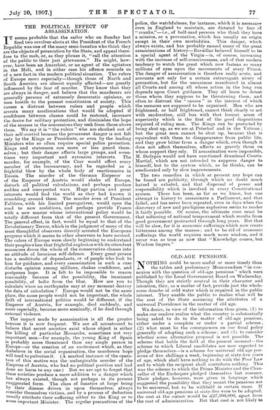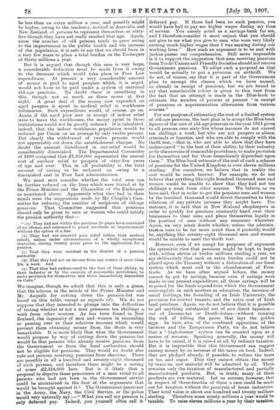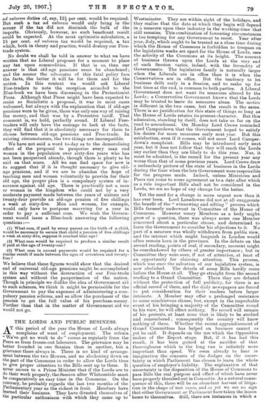OLD-AGE PENSIONS. N OTHING could be more useful or more timely
than the tables and preliminary Memorandum "in con- nexion with the question of old-age pensions" which were published by the Local Government Board on Wednesday. Though they are strictly neutral in their character and intention, they, as a matter of fact, provide just the whole- some douche of cold water which is required in the public interest. They enable the public to realise what will be the cost of the State assuming the attributes of a universal Providence in the matter of old age.
We desire, in view of the information thus given, (1) to make our readers realise what the country is substantially being asked to do in the matter of old-age pensions, either under a complete or under a partial scheme ; (2) what must be the consequences on our fiscal policy generally of adopting such a scheme; and (3) to consider whether some alternative proposal is not possible. The scheme that holds the field at the present moment—the scheme to which Liberal candidates are now expected to pledge themselves—is a scheme for universal old-age pen- sions of five shillings a week, beginning at sixty-five years of age, which shall have nothing to do with the Poor Law and to which the recipient shall contribute nothing. This was the scheme to which the Prime Minister and the Chan- cellor of the Exchequer pledged themselves last summer. Their pledges, however, were given in language which suggested the possibility that they meant the pensions not to be universal, but to be withheld in certain cases. If universal old-age pensions at sixty-five were to be adopted, the cost at the outset would be .X27,508,000, apart from the cost of administration. But that cost is not likely to be less than an extra million a year, and possibly might be higher, owing to the tendency, noticed in Australia and New Zealand, of persons to represent themselves as sixty- five though they have not really reached that age. Again, since the number of old persons tends to grow owing to the improvement in the public health and the increase of the population, it is safe to say that we should have in a very few years to place a total burden on the Exchequer of thirty millions a year.
But it is argued that though this sum is very large, a considerable deduction must be made from it owing to the decrease which would take place in Poor Law expenditure. At present a very considerable amount of money is paid to aged paupers which, it is urged, would not have to be paid under a system of universal old-age pensions. No doubt there is something in this, though not as much as there seems at first sight. A great deal of the money now expended on aged paupers is spent in medical relief in workhouse infirmaries. Such expenditure would, of course, go on. Again, if the aged poor now in receipt of indoor relief were to leave the workhouses, the money spent in those institutions would not be greatly reduced. It is calculated, indeed, that the indoor workhouse population would be reduced per Union on an average by only twelve persons. But clearly the withdrawal of twelve persons would not appreciably cut down the establishment charges. No doubt the amount distributed in out-relief would be considerably diminished. The Departmental Committee of 1899 computed that £1,858,000 represented the annual cost of outdoor relief to paupers of sixty-five years of age and over. This in all probability is the total amount of saving to be reckoned on owing to a diminished cost in Poor Law administration.
We must next consider whether the total sum can be further reduced on the lines which were hinted at by the Prime Minister and the Chancellor of the Exchequer as mentioned above. Apparently what they had in their minds were the suggestions made by Mr. Chaplin's Com- mittee for reducing the number of recipients of old-age pensions. That Committee suggested that pensions should only be given to men or women who could satisfy the pension authority that- " (a) They had not within the previous 20 years bean convicted of an offence, and sentenced to penal servitude or imprisonment without the option of a fine.
(Er) They had not received poor relief (other than medical relief), unless under circumstances of a wholly exceptional character, during twenty years prior to the application for a pension.
(c) That they were resident in the district of a pension authority.
(d) That they had not an income from any source of more than 10s. a week. And
(s) That they had endeavoured to the best of their ability, by their industry or by the exercise of reasonable providence, to make provision for themselves and those immediately dependent on them."
We imagine, though we admit that this is only a guess, that the scheme in the minds of the Prime Minister and Mr. Asquith for cutting down the pension-list was based on this table, except as regards (d). We do not suppose that they intended to plunge into the difficulties of testing whether or not a man possesses ten shillings a week from other sources. As has been found in New Zealand, the ingenuity of men and women in concealing or passing over to their relatives incomes which would prevent them obtaining money from the State is very remarkable. It is more likely that what the Government would propose by way of cutting down the pension-list would be that persons who already receive pensions from the Government or from the local authorities should not be eligible for pensions. They would no doubt also rule out persons receiving pensions from charities. There are possibly in all a hundred and seventy-eight thousand of such persons, and therefore there might be a saving of some £2,314,000 here. But is it likely that a proposal to deprive these pensioners of a sum voted to all persons who had not been in the Government service could be maintained in the face of the arguments that would be brought against it ? The Government pensioner in the Army, the Navy, the Civil Service, or the police would very naturally say :—" What you call my pension is only deferred pay. Indeed, you yourself often call it deferred pay. If there had been no such jzoension, you would have had to pay me higher wages during my time of service. You merely acted as a savings-bank for me, and I therefore consider it most unjust that you should not give to me what you give to men who were very likely earning much higher wages than I was earning during our working lives." How such an argument is to be met with justice passes our comprehension. Still more impossible is it to support the suggestion that men receiving pensions from Trade-Unions and Friendly Societies should not receive Government pensions. To adopt such a proposal as that would be actually to put a premium on unthrift. We do not, of course, say that it is part of the Government plan to exempt the classes which we have named, as already in receipt of pensions, but we are bound to say that considerable colour is given to this view from the fact that an attempt is made in the Blue-book to estimate the number of persons at present "in receipt of pensions or superannuation allowances from various sources."
For our purpose of estimating the cost of a limited system of old-age pensions, the best plan is to accept the Blue-book figures of the cost of old-age pensions in the year 1911 given to all persons over sixty-five whose incomes do not exceed ten shillings a week, but who are not paupers or aliens, criminals or lunatics, and who are able to comply with the thrift test,—that is, who are able to show that they have endeavoured "to the best of their ability, by their industry or by the exercise of reasonable providence, to make provision for themselves and for those immediately dependent upon them." The Blue-book estimate of the cost of such a scheme of pensions for the United Kingdom is over eleven millions sterling. For ourselves, we believe that in reality the cost would be much heavier. For example, we do not believe that anything like eight hundred thousand men and women would be unable to show that they had not ten shillings a week from other sources. We believe, as we have said, that in order to get the pensions men and women by the hundred thousand would divest themselves to their relations of any private incomes they might have. For instance, it is said that in New Zealand shopkeepers in order to qualify for pensions constantly hand over their businesses to their sons, and place themselves legally in the position of men without any resources whatever.
am, we very much doubt whether, unless the adminis- trabion were to be far more strict than it probably would be, anything like seventy-eight thousand men and women would be unable to meet the thrift test.
However, even if we accept for purposes of argument the optimistic view that pensions might be kept, to begin with, within eleven or twelve millions sterling a year, we say deliberately that such an extra burden could not be placed upon the Treasury without a dislocation of our fiscal system which must end in the abandonment of Free- trade. As we have often argued before, the money cannot be got by savings, because even if savings were made in our present expenditure, all those savings will be required for the fresh expenditure which the Government contemplate in such matters as education, the increase of small holdings, the founding of an Irish University, the provision for evicted tenants, and the extra cost of Irish land purchase. Again, we do not believe that it is possible to get anything substantial out of new direct taxation— out of Income-tax or Death-duties—without running the risk of killing the goose that lays the golden eggs. In view, also, of the combined opposition of the brewers and the Temperance Party, we do not believe that a " high-license " system can be counted upon as a source of revenue. Speaking generally, the money will have to be raised, if it is raised at all, by indirect taxation. But it is impossible that this Government can suggest raising money by an increase of the taxes on food. Indeed, they are pledged already, if possible, to reduce the taxes on tea and sugar. That they cannot obtain the money by taxes on raw material will be admitted by all. There remains only the taxation of manufactured and partially manufactured products. But, in truth, many of these products are raw material. Let us assume, however, that in respect of three-fourths of them a case could be made out for taxation without the paralysis of home industries. Their total value is about one hundred and twenty millions sterling. Therefore some ninety millions a year would be taxable. To raise eleven millions a year by their taxation, ad valorem duties of, say, 12i per cent. would be required. But such a, tax ad valorem would only bring in the money if the tax did not diminish the bulk of the imports. Obviously, however, no such beneficent result could be expected. At the most optimistic calculation, a 15 per cent. ad valorem, tax would be required, a tax which, both in theory and practice, would destroy our Free- trade system.
No doubt we shall be told in answer to what we have written that no Liberal proposes for a moment to place any tax upon commodities. If that is so, then our answer is that old-age pensions must be abandoned; and the sooner the advocates of this fatal policy face the facts, the better it will be for them and for the nation. In this context we would ask Liberal Free-traders to note the reception accorded to the Blue-book we have been discussing in the Protectionist Press. Although that Press might have been expected to resist so Socialistic a proposal, it was in most cases welcomed, but always with the explanation that if old-age pensions were to be given, there was only one way of raising the money, and that was by a Protective tariff. That comment is, we hold, perfectly sound. If Liberal Free- traders will only have the courage to look at the facts, they will find that it is absolutely necessary for them to choose between old-age pensions and Free-trade. In existing circumstances, the two things are incompatible.
We have not said a word to-day as to the demoralising effect of the proposal to pauperise every man and woman in the population over sixty-five years who has not been pauperised already, though there is plenty to be said on that score. All we can find space for now is to suggest that if it is thought necessary to give old- age pensions, and if we are to abandon the hope of teaching men and women voluntarily to provide for their old age, the proper plan is a compulsory system of in- surance against old age. There is practically not a man or woman in the kingdom who could not by a very moderate payment made between the years of sixteen and twenty-four provide an old-age pension of five shillings a week at sixty-five. Men and women, for example, would only have to postpone marrying for a year in order to pay a sufficient sum. We wish the Govern- ment would issue a Blue-book answering the following questions :— (1) What sum, if paid by every parent on the birth of a child, would be necessary to secure that child a pension of five shillings a week at sixty-five, suppose it reached that age?
(2) What sum would be required to produce a similar result if paid at the age of twenty-one ?
(3) What sum in annual payments would be required for a similar result if made between the ages of seventeen and twenty- four ?
We believe that these figures would show that the desired end. of universal old-age pensions might be accomplished in this way without the destruction of our Free-trade system and without the pauperisation of the nation. Though in principle we dislike the idea of Government aid to such schemes, we think it might be permissible for the Government to pay the expenses of administering a com- pulsory pension scheme, and so allow the purchaser of the pension to get the full value of his purchase-money. Further than that in the matter of Government aid we would not go.








































 Previous page
Previous page